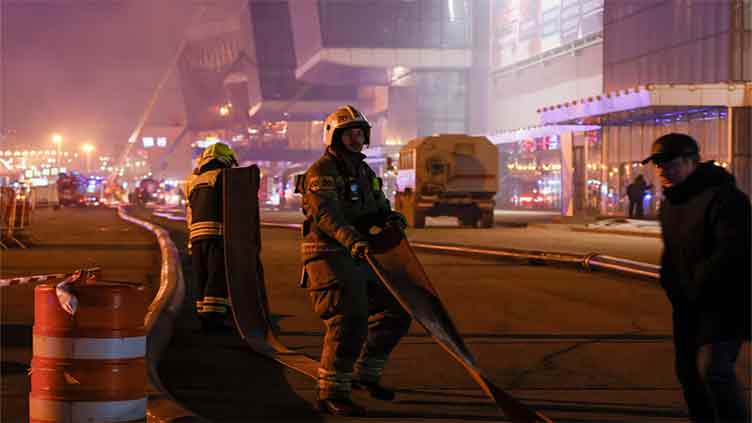What we know about the shooting at a concert venue near Moscow

World
What we know about the shooting at a concert venue near Moscow
MOSCOW (Reuters) - Armed men burst into the Crocus City Hall near Moscow on Friday, killing at least 143 people and injuring many dozens more in the deadliest attack in Russia since the 2004 Beslan school siege.
What do we know about the attack?
THE ATTACK
The four men, armed with Kalashnikov automatic weapons, arrived at the Crocus City Hall at around 7:40 p.m. (1640 GMT) in a minivan.
The men walked calmly towards the metal detectors at Crocus City Hall, firing their automatic weapons point-blank in short bursts at terrified civilians who fell screaming in a hail off bullets.
Verified video showed people rushing for the exits as repeated gunfire echoed above screams. The attackers walked through the concert hall aiming and then firing at civilians with controlled bursts.
Russian investigators said the men began to set fire to the building. Some witnesses said they poured some sort of liquid on seating and curtains in several places before igniting it.
DEATH TOLL
Russia's investigative committee said the death toll was 133 but Margarita Simonyan, a Russian state TV journalist and the head of Russia Today, said the toll was 143.
Some sources said 145 people were injured. The Moscow Region said 121 people had been wounded. Earlier it had said 60 of the injured were in a critical condition.
RESPONSIBILITY
Islamic State, the militant group that once sought control over swathes of Iraq and Syria, claimed responsibility for the attack, the group's Amaq agency said on Telegram about four hours after the shooting began.
"The attack comes within the context of a raging war between the Islamic State and countries fighting Islam," Amaq added in a statement citing security sources.
The United States has intelligence confirming Islamic State's claim of responsibility for a deadly shooting at a concert near Moscow, two U.S. officials said on Friday.
The officials said the United States had warned Russia in recent weeks about the possibility of an attack - a move they said prompted the U.S. embassy in Moscow to issue a warning to Americans.
Two weeks ago the U.S. embassy in Russia warned that "extremists" had imminent plans for an attack in Moscow.
Hours before the embassy warning, the Federal Security Service (FSB) said it had foiled an attack on a Moscow synagogue by Islamic State's affiliate in Afghanistan, which is known as ISIS-Khorasan or ISIS-K and seeks a caliphate across Afghanistan, Pakistan, Turkmenistan, Tajikistan, Uzbekistan and Iran.
"We did warn the Russians appropriately," one of the U.S. officials said, speaking on condition of anonymity.
Russian President Vladimir Putin said in an address to the nation that that the four men who attacked a concert near Moscow were heading towards Ukraine when they were detained, and that they hoped to cross the border.
"They tried to hide and moved towards Ukraine, where, according to preliminary data, a window was prepared for them from the Ukrainian side to cross the state border," Putin said.
Putin cast the enemy as "international terrorism" and said that he was ready to work with any state which wanted to defeat it. Ukraine has denied any involvement in the attack.
Ukrainian military intelligence spokesman Andriy Yusov told Reuters: "Ukraine was of course not involved in this terror attack."
THE ATTACKERS
Russia's Federal Security Service (FSB) said it had detained 11 people including the four men who carried out the attack. Russian media said the men had fled the scene in a white car and that the men were detained in the Bryansk region, about 340 km (210 miles) southwest of Moscow.
Some of the suspects were shown being interrogated on the side of the road in footage published by Russian media and Telegram channels with close ties to the Kremlin.
"I shot people," one of the suspects, his hands tied and his hair held by an interrogator, a black boot beneath his chin, said in poor and highly-accented Russian. He gave his date of birth as 17 September, 1998 and his name as Shamsutdin Fariddun.
When asked why, he said: "For money." The man said he had been promised half a million roubles (a little over $5,000) over Telegram where he had been listening to a preacher.
The man was asked if he had been in Turkey on March 4 and he said "yes". They were told where weapons stores were and took weapons from there, the man said.
One of the suspects, with a bruised and cut face, was shown speaking via Tajik translator. Another was shown being marched out a forest, his face covered in blood from what appeared to be an ear injury.
Under questioning, he said his name was Rajab Alizadeh. He had trouble giving his date of birth in Russian.


